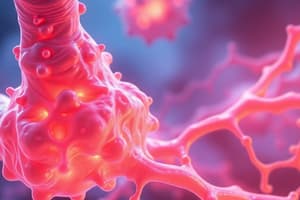Podcast
Questions and Answers
What type of connective tissue is made up of sporadically distributed fibroblasts in a gel-like ground substance?
What type of connective tissue is made up of sporadically distributed fibroblasts in a gel-like ground substance?
- Adipose connective tissue
- Dense regular connective tissue
- Mucoid connective tissue (correct)
- Reticular connective tissue
Loose connective tissues include areolar, dense, and reticular connective tissues.
Loose connective tissues include areolar, dense, and reticular connective tissues.
False (B)
Name the type of connective tissue that supports and protects internal organs by storing triglycerides.
Name the type of connective tissue that supports and protects internal organs by storing triglycerides.
Adipose connective tissue
The ________ fibres in dense irregular connective tissue exhibit irregular arrangements and few fibroblasts.
The ________ fibres in dense irregular connective tissue exhibit irregular arrangements and few fibroblasts.
Match the following connective tissues with their characteristics:
Match the following connective tissues with their characteristics:
Which term describes the semi-fluid ground substance found in mesenchymal tissue?
Which term describes the semi-fluid ground substance found in mesenchymal tissue?
Elastic connective tissue is primarily made of collagen fibers.
Elastic connective tissue is primarily made of collagen fibers.
What type of connective tissue serves as packing material for the body cavities?
What type of connective tissue serves as packing material for the body cavities?
What type of cartilage is the most abundant in the body?
What type of cartilage is the most abundant in the body?
Fibrocartilage contains a perichondrium.
Fibrocartilage contains a perichondrium.
What is the primary function of blood plasma?
What is the primary function of blood plasma?
Cartilage is comprised of ________ thick collagen fibers embedded in a gel-like ground substance.
Cartilage is comprised of ________ thick collagen fibers embedded in a gel-like ground substance.
Where are chondrocytes located?
Where are chondrocytes located?
Match the type of cartilage with its characteristics:
Match the type of cartilage with its characteristics:
The primary purpose of lymph is to transport blood cells.
The primary purpose of lymph is to transport blood cells.
What are two structures formed by elastic cartilage?
What are two structures formed by elastic cartilage?
Flashcards are hidden until you start studying
Study Notes
Mesenchymal Tissue
- Contains mesenchymal cells within a semifluid ground substance and reticular fibers.
- Forms the basis of nearly all types of connective tissue.
- Example: First skeleton in developing embryos.
Mucoid Connective Tissue
- Characterized by sparsely distributed fibroblasts within a gel-like ground substance and thin collagen fibers.
- Provides mechanical support to adjacent tissues.
- Example: Found in the umbilical cord.
Mature Connective Tissues
- Divided into loose and dense connective tissues.
Loose Connective Tissue
- Comprise sparsely distributed cells and fibers.
- Subtypes include areolar connective tissue, adipose tissue, and reticular connective tissue.
Areolar Connective Tissue
- Widely distributed throughout the body.
- Contains all three fiber types and various cells suspended in a semifluid ground substance.
- Supports, reinforces, and provides elasticity to organs; serves as "packing material" for body cavities.
Adipose Connective Tissue
- Composed of adipocytes that store triglycerides, primarily in the form of white adipose tissue.
- Insulates the body, stores energy, and supports/protects internal organs.
Reticular Connective Tissue
- Comprises tightly woven reticular fibers and fibroblasts.
- Functions to filter substances, such as lymph in lymph nodes and spleen.
Dense Connective Tissue
- Contains packed protein fibers with fewer cells compared to loose connective tissues.
Dense Regular Connective Tissue
- Features packed collagen fibers and sparse fibroblasts; collagen bundles appear shiny.
- Provides great tensile strength; found in tendons, ligaments, and aponeuroses.
Dense Irregular Connective Tissue
- Composed of irregularly arranged collagen fibers with sparse fibroblasts.
- Resists pulling stress from various directions; located in fasciae and pericardium.
Elastic Connective Tissue
- Made primarily of elastic fibers and few fibroblasts.
- Allows elasticity in various organs; present in lung tissue, walls of elastic arteries, and trachea.
Cartilage
- Contains thick collagen fibers embedded in a gel-like ground substance.
- ECM includes hydrated proteoglycans such as chondroitin sulfate, providing compressional resistance.
- Cells called chondrocytes occupy spaces known as lacunae; cartilage is avascular and heals slowly.
- Some types are covered by perichondrium, a layer of new chondrocytes with blood vessels.
Types of Cartilage
- Hyaline cartilage: Most common type, overlaid by perichondrium, provides smooth surfaces at joints, forms fetal skeleton.
- Fibrocartilage: Lacks perichondrium; strongest cartilage type; found in pubic symphysis and intervertebral discs.
- Elastic cartilage: Contains perichondrium; provides strength and flexibility; found in the auricle and epiglottis.
Bone Tissue
- Divided into compact and spongy bone; compact bone has repeating units called osteons.
- Osteons consist of calcified ECM rings featuring lacunae (housing osteocytes) and a central canal containing blood vessels and nerves.
Liquid Connective Tissues
- Blood: Liquid ECM (plasma) combined with blood cells; crucial for transporting oxygen, nutrients, gases, wastes, hormones, and immunological components.
- Lymph: Liquid tissue with lower protein content than blood plasma; varies based on body location, mainly consists of lymphocytes exiting nodes and dietary fats exiting the small intestine.
Studying That Suits You
Use AI to generate personalized quizzes and flashcards to suit your learning preferences.



